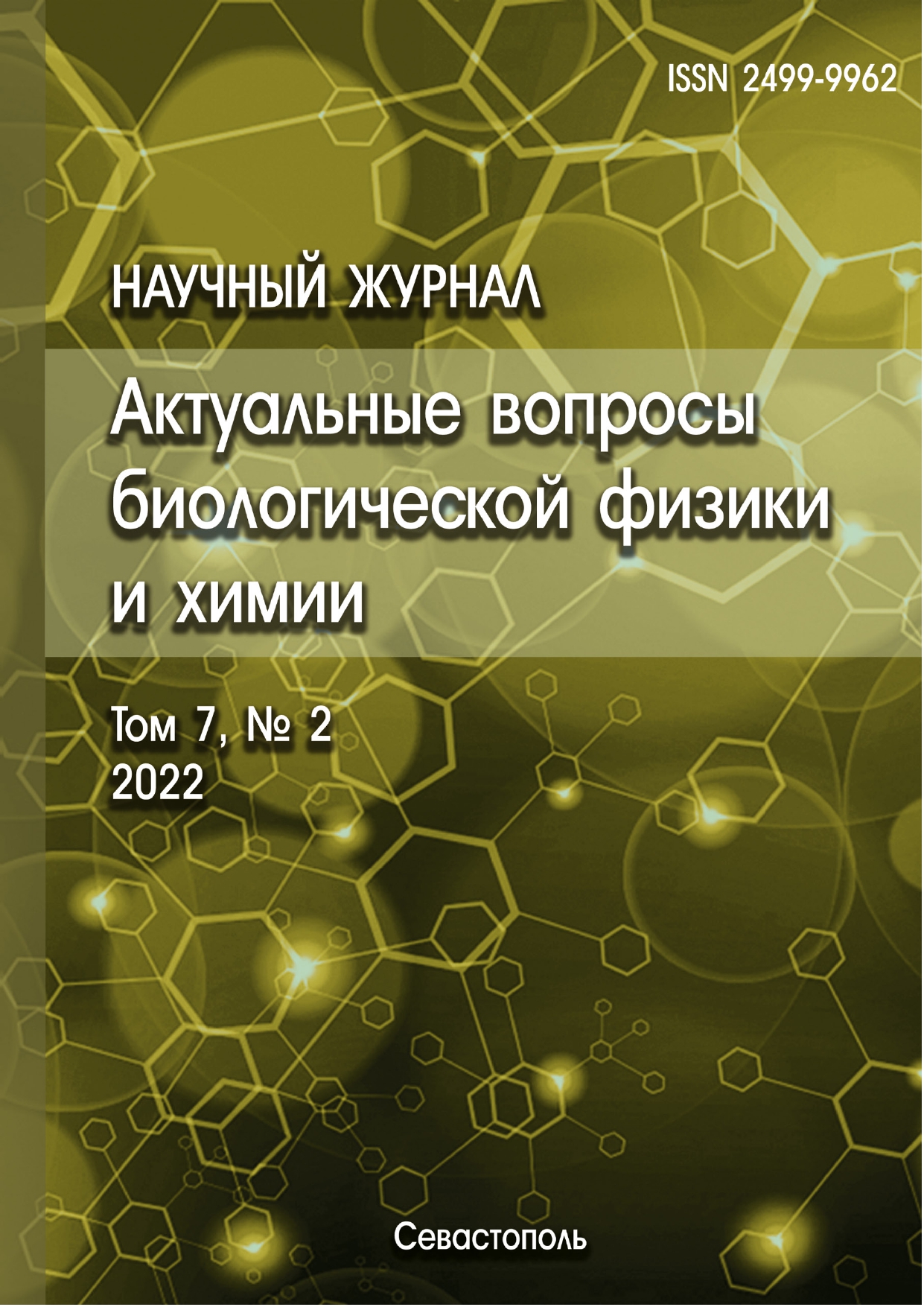Yerevan, Armenia
Yerevan, Armenia
Yerevan, Armenia
Yerevan, Armenia
Study on the interaction of DNA-specific compound Hoechst 33258 with bovine serum albumin (BSA) has been carried out, using the methods of absorption, differential and fluorescence spectroscopies. On the basis of the absorption and fluorescence spectra of the complexes of this ligand with BSA, in wide interval of the change of r (r=ligand/albumin), the dependence curves of the relative changes of the absorption (A/A0) and fluorescence (F/F0) maxima of the complexes H33258-BSA on the macromolecule concentration, were constructed. The dependence curve of A/A0 monotonously decreases along with protein concentration increasing due to the formation of the complexes. It was revealed that the dependence curve of F/F0 is not linear and is consisted of two regions: at low concentrations of the protein this curve decreases linearly, and passing through the minimum point, at relatively high concentrations of the protein starts linearly increasing. It was also shown that the differential spectra of the complexes H33258-BSA are characterized by hypo- and hyperchromic effects and hypsochromic shift: at low concentrations of the protein a hypochromic effect occurs, at higher concentrations of the protein (beginning from the certain ratios ligand/albumin ~1:1), the differential spectra are hypsochromically shifted with hyperchromic effect. The obtained data find out that Hoechst 33258, being DNA-specific ligand, tightly binds to albumin.
Hoechst 33258, bovine serum albumin, complex-formation, spectra, spectroscopic methods
1. Suryawanshi V.D., Walekar L.S., Gore A.H., Anbhule P.V., Kolekar G.B. Spectroscopic analysis on the binding interaction of biologically active pyrimidine derivative with bovine serum albumin. Journal of Pharmaceutical Analysis, 2016, vol. 6, no. 1, doi:https://doi.org/10.1016/j.jpha.2015.07.001.
2. Kandagal P.B., Ashoka S., Seetharamappa J., Shaikh S.M.T., Jadegoud Y., Ijare O.B. Study of the interaction of an anticancer drug with human and bovine serum albumin: spectroscopic approach. J. Pharm. Biomed. Anal., 2006, vol. 41, doi:https://doi.org/10.1016/j.jpba.2005.11.037.
3. Zhu X., Sun J., Hu Y. Determination of protein by hydroxypropyl-beta-cyclodextrin sensitized fluorescence quenching method with erythrosine sodium as a fluorescence probe. Anal. Chim. Acta, 2007, vol. 596, doi:https://doi.org/10.1016/j.aca.2007.06.008. EDN: https://elibrary.ru/KDWVCV
4. Suryawanshi V.D., Anbhule P.V., Gore A.H., Patil S., Kolekar G. Spectroscopic Investigation on the Interaction of Pyrimidine Derivative, 2-Amino-6-hydroxy-4-(3,4-dimethoxyphenyl)-pyrimidine-5-carbonitrile with Human Serum Albumin: Mechanistic and Conformational Study. Ind. Eng. Chem. Res., 2012, vol. 51, doi:https://doi.org/10.1021/ie202005c.
5. He X.M., Carter D.C. Atomic structure and chemistry of human serum albumin. Nature, 1992, vol. 358, doi:https://doi.org/10.1038/358209a0.
6. Mote U.S., Bhattar S.L., Patil S.R., Kolekar G.B. Interaction between felodipine and bovine serum albumin: Fluorescence quenching study. Luminescence, 2010, vol. 25, doi:https://doi.org/10.1002/bio.1130.
7. Wang Y.Q., Zhang H.M., Zhang G.C., Tao W.H., Fei Z.H., Liu Z.T. Spectroscopic studies on the interaction between silicotungstic acid and bovine serum albumin. J. Pharm. Biomed. Anal., 2007, vol. 43, doi:https://doi.org/10.1016/j.jpba.2007.01.001.
8. Anbazhagan V., Renganathan R. Study on the binding of 2,3-diazabicyclo[2.2.2]oct-2-ene with bovine serum albumin by fluorescence spectroscopy. J. Lumin., 2008, vol. 128, doi:https://doi.org/10.1016/j.jlumin.2008.02.004. EDN: https://elibrary.ru/KFMPQV
9. Holmgaard List N., Knoops J., Rubio-Magnieto J., Ide J., Beljonne D., Norman P., Surin M., Linares M. Origin of DNA-induced circular dichroism in a minor-groove binder. J. Am. Chem. Soc., 2017, vol. 139, doi:https://doi.org/10.1021/jacs.7b05994.
10. Bucevicius J., Lukinavicius G., Gerasimaite R. The use of Hoechst dyes for DNA staining and beyond. Chemosensors, 2018, vol. 6, no. 18, doi:https://doi.org/10.3390/chemosensors6020018. EDN: https://elibrary.ru/YGKRRR
11. Zhang X.X., Brantley Sh.L., Corcelli S.A., Tokmakoff A. DNA minor-groove binder Hoechst 33258 destabilizes base-pairing adjacent to its binding site. Comm. Biol., 2020, vol. 3, doi:https://doi.org/10.1038/s42003-020-01241-4. EDN: https://elibrary.ru/SOXSTK
12. Angelbello A.J., Chen J.L., Childs-Disney J.L., Zhang P., Wang Z.F., Disney M.D. Using genome sequence to enable the design of medicines and chemical probes. Chem. Rev., 2018, vol. 118, doi:https://doi.org/10.1021/acs.chemrev.7b00504. EDN: https://elibrary.ru/YIAQVN
13. Ojha H., Murari Bh.M., Anand Sn., Hassan M.I., Ahmad F., Chaudhury N.K. Interaction of DNA Minor Groove Binder Hoechst 33258 with Bovine Serum Albumin. Chem. Pharm. Bull., 2009, vol. 57, no. 5, doi:https://doi.org/10.1248/cpb.57.481.
14. Antonyan A.P., Petrosyan N.R., Vardevanyan P.O. Comparative study of spectral characteristics of Hoechst 33258 and MS complexes with BSA. Journal of Applied Spectroscopy, 2021, vol. 88, no. 6, doi:https://doi.org/10.47612/0514-7506-2021-88-6-942-947. (In Russ.) EDN: https://elibrary.ru/ZCXTTW
15. Antonyan A.P., Parsadanyan M.A., Petrosyan N.R., Vardevanyan P.O. Fluorescent characteristics of Hoechst 33258 complexes with serum albumin and DNA. Journal of Applied Spectroscopy, 2022, vol. 89, no. 4. (In Russ.) DOI: https://doi.org/10.47612/0514-7506-2022-89-4-519-524; EDN: https://elibrary.ru/DHJWOG
16. Lakowicz J.R. Principles of Fluorescence Spectroscopy. Third Edition. Maryland: University of Maryland, School of Medicine Baltimore, 2006. DOI: https://doi.org/10.1007/978-0-387-46312-4; EDN: https://elibrary.ru/SRCMIR










